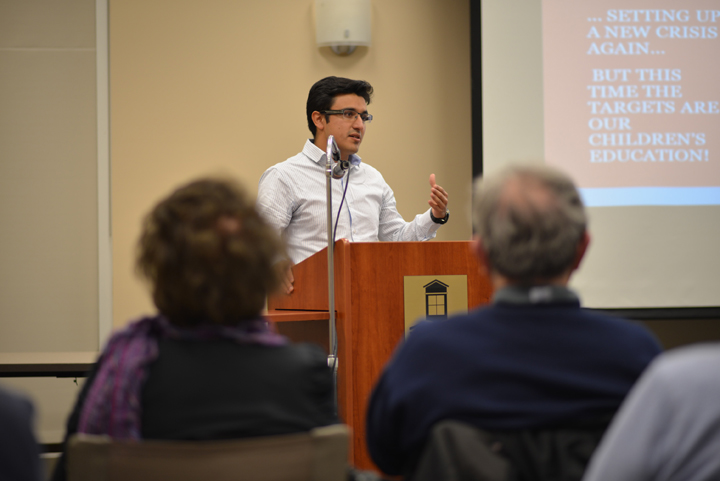
Pat Barcas/staff photographer
Byron Sigcho, educator and activist and lead instructor at the UIC Center for Literary said the proliferation of charter schools in Chicago since 2006 is the next financial bubble to burst.
By Pat Barcas
Staff Writer
pat@foxvalleylabornews.com
Thursday, Jan. 30, 2014
BATAVIA — A suburban panel of teachers and education researchers want everyone to know the negative side of charter schools, and to stop the flow of charter schools from Chicago into the suburbs.
Northern Illinois Jobs with Justice hosted a panel of education experts Jan. 23 in Batavia who presented the many negative facets of charter schools — including corruption, under performance, and waste. The group wants passage of House Bill 3754, or Senate Bill 2627, which aim to dissolve the Illinois Charter Commission.
Charter schools are publicly funded, yet privately operated schools. They are now in 42 American states, and Wash. D.C., and they can be run for-profit or non-profit.
They are seen as deregulated and have more autonomy than a full public school, but they also must be accountable to the organization that gave them their charter, and also to the parents of students.
Dr. Chris Lubienski, one of the presenters, has studied public and private schools and has authored “The Public School Advantage, Why Public Schools Outperform Private Schools.”
He said charter schools were originally championed by teachers unions, but today have grown no more innovative than public schools. His studies show that public schools today have more growth than charter schools.
“The autonomy actually had a negative effect,” he said. “Overall, most charters perform no different or at a level under public schools. They are also more segregated with fewer special education or minority students. This serves as a vehicle for white flight.”
They perform the same or worse, but cost more. Where is all the extra money being spent?
Sarah Hainds, researcher for the Chicago Teachers Union, said not much data is available about Chicago charter schools, but what has been uncovered from the Civic Federation shows that charters spend more on administration and personnel salaries, and less on instruction and curriculum.
“There are few studies that exist, for a variety of reasons: there’s difficulty in the analysis, lack of data, data inconsistencies, and students may not be comparable between schools,” she said.
“There’s definitely a profit motive behind it,” said Dr. Jean Pierce, chair of the Faculty of Educational Psychology at Northern Illinois University. “We have shown that politicians get their cut and CEOs make millions.”
A Chicago Sun Times series of articles was cited by Byron Sigcho, educator and activist and lead instructor at the UIC Center for Literary. He presented powerful facts about Chicago’s charter school past, including the United Neighborhood Organization, or UNO, an organization that operates 11 charter schools in Chicago.
He said the proliferation of charter schools in Chicago since 2006 is the next financial bubble to burst, as charters rely more heavily on loans to operate.
“In 2006, UNO’s schools expanded heavily with taxpayer money and bonds. This was despite no feasability studies or need for expansion,” he said.
Sigcho said by 2008, the schools were running huge $1.7 million deficits. A $65 million private loan kept them afloat later in 2008, and they were still allowed by city hall to expand.
In 2011, it was uncovered that only 45 cents of every $1 spent at UNO schools went into the classroom. Juan Rangel, the CEO, was making more than the mayor of Chicago, with window refurbishing contracts worth millions going to relatives.
“The rest of this money goes toward debt and high salaries,” said Sigcho. “This capital was achieved through political clout, and laundered through political campaigns.”
The dissolution of the Illinois Charter Commission was addressed by State Sen. Linda Holmes.
Opponents of the commission say the commission can accept contributions from anyone, it has accepted two concept charter schools with questionable commections to Rep. Madigan, and the commission’s primary purpose is to override school board rejections of charters, and undermine local control.
“This is an issue that is front and center in Springfield,” said Holmes. “If the bill (SB 2627) is not picked up, I will be picking it up. It’s ridiculous to have charter school that don’t have to follow the rules, and I see a lot of issues. This is something we need to take a very serious look at.”

Not a shred of statistical evidence is presented here.
““Overall, most charters perform no different or at a level under public schools. They are also more segregated with fewer special education or minority students. This serves as a vehicle for white flight.” Really? Where are the references to studies or data support this (erroneous) conjecture.
Dear Kent, (chairman of K12connect, Inc.)
You can check Dr. Lubienski’s book for references and evidence: http://www.press.uchicago.edu/ucp/books/book/chicago/P/bo16956223.html
Could you please providence studies that suggest otherwise? I would like to see that evidence as well.
Thanks,
Byron